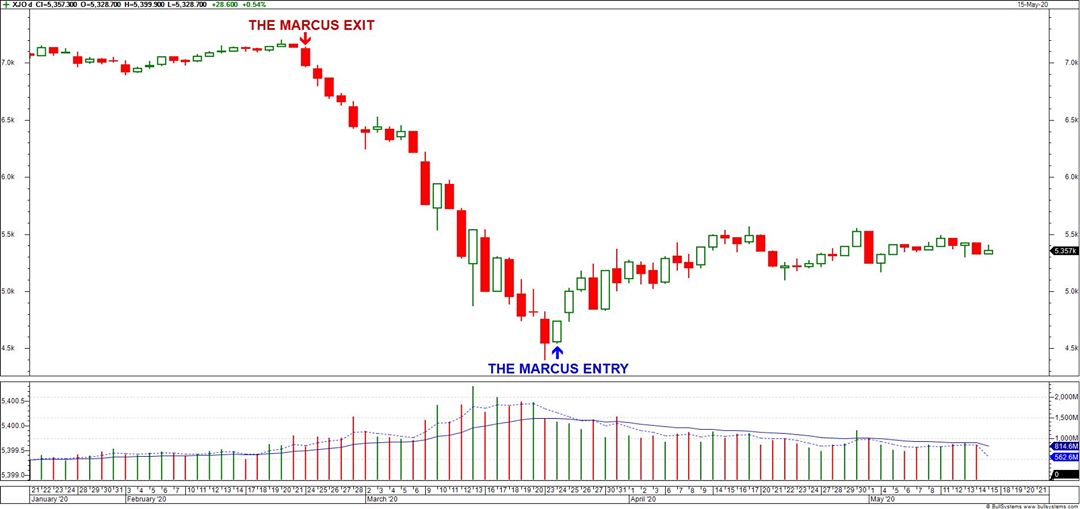20 Ways to Beat the Herd
The Growth Portfolio we manage for our investors and Members ($55m) has outperformed over the COVID-19 outbreak. For us COVID-19 was not a disaster, the volatility it caused proved to be a fabulous opportunity instead. And as the market fell over on Thursday and Friday last week (11th and 12th June 2020) we see another fabulous opportunity beginning - and as of Friday, we are "All out".
The Marcus Today Growth SMA as of 10/6/2020 had outperformed the ASX 300 Accumulation benchmark by 26.87% since the coronavirus hit on February 20. It was up 19.19% in a year when the All ordinaries is down 4% and was up 36.61% from the bottom on March 24. It is now in 100% cash.
How have we outperformed? And why have we locked it in? At the risk of letting out our Secret Herbs and Spices, this is how and why. Twenty Ways to Beat the Herd. These lessons are not for everyone, most fund managers are too big to do this, but for a $55m fund like ours, and for private investors that are not shackled by liquidity issues and an Ivory Tower Committee that never decides anything, this is something to pin on the fridge.
How to manage a portfolio in volatile times. In fact, all the time. This is working:
-
Putting your investors first. They are the only thing that matters. We are also invested in the fund we manage so essentially all we are doing is looking after ourselves, everyone else is along for the ride, in the same boat, we are all, manager and investors, 100% aligned in our interests. So we do with the fund what we would do for ourselves. Any fund manager not invested in the fortunes of their own skills shouldn't be on the job.
- Having the ability to go to 100% cash. Most fund managers can’t. The good news is that individual investors, can. Institutional fund managers would kill for a lack of liquidity issues. It is a private investor's biggest advantage over a fund.
-
Being brave enough to go to cash. Most fund managers
won’t even if they could. We went to 100% cash when the market looked like collapsing last
year. It was premature but it taught us to be bold and it paved the way
to do it again when the coronavirus arrived and the market became
precipitous once more. We went to 70% cash on February 20. We fully reinvested on March 24. And we've just gone to cash again - 100% this time. We're booking the profits and letting the market settle down for a moment.
-
Working as a small team, not alone. You need bouncing
boards, other intelligent, engaged people on an assortment of wavelengths.
People who are objective, are not easily intimidated, and speak freely. People who can harden your resolve or question it. Working alone means more mistakes. Too big an investment
team constipates the investment process, lengthens reaction times and creates a
hierarchy that mutes ideas. You need something in the middle.
-
Being unemotional. It takes a lot of experience to be truly
objective. If you ever 'love' a stock or 'hate' a stock, you’re missing the
point. You can't invest on 'feelings'. Think more like Spock, and less like Romeo & Juliet.
- Seeing every moment as an opportunity. They say "Never waste a good crisis". Volatility provides opportunity. When the herd is charging around, that's when you get off the sideline and play harder, not back out, which is the usual reaction.
-
Not focusing on the long term all the time. Long term bottom-up stock picking doesn’t work all the time. Don't end up being one of those buy and hold nuff-nuffs. Its blinkered.
-
Putting asset allocation before stock picking when necessary. Sometimes the whole market moves and you have to do something about it no matter the quality of the stocks you hold. You can always come back later, hopefully when the same stocks are cheaper.
- Not making grand (unmakeable) predictions about the future. This is how some investors think the market works – it is not. Its called guessing. React don’t predict.
- Not ever thinking or saying “Its OK it’ll be alright in the end” (Did your adviser tell you that?). It is a professional cop out. It means "I don’t know what to do, I know you’re paying me an annual fee to handle your investments but my speciality is superannuation legislation not timing shares, and please don’t sell, it took so long to get you to buy something, I don’t want to have to go through that whole process again, and if you do sell I have to do all this profitless unpaid admin just to lose my fees, and anyway...don’t you know you can’t time the market, everyone knows that....don’t they?”
- Stock picking on themes. Investing in themes works. There are tides in the stock market, lots of them. Swim with the tides not against them. Get the themes right and the stocks pick themselves.
- Watching the herd not joining the herd. An innocuous sounding motherhood statement. But this is the key to success in volatile times. Spotting the herd's change of mood requires you to have your finger on the pulse of the market, all the time.
-
Knowing that at times the quality of the stocks you hold will not make any difference if the market collapses. King Canute is famous for a reason. Because it doesn't matter who you are, what you hold, the market doesn't care, it will still run you over.
-
Being decisive. Being bold. “Be bold and mighty forces will come to your aid” (name that film). Volatile markets are not for the timid.
- Making decisions fast. In a world of high frequency trading, algorithms, computer driven trading and the new one, ETF selling, you don’t have as much time as you used to. One of our Members posted this on Facebook for our other Members. When precipitous moments come, do something.

- There is never a rush to buy. Confidence is three times harder to generate than fear. Some people embarrassed themselves calling the bottom of the February correction after a week. Corrections start fast and trend. Believe the herd even when they sell quickly. They are bigger than you are and prone to hangovers.
- Being flexible of mind. Don’t get set in your opinion. Don’t be a bull or a bear. It suggests a pre-conceived inflexibility, which sets you up to be wrong half the time. You need to move with the herd, not put a stake in the ground. The stampede won't stop for you.

- Sell easily. Most investors find this very hard having been indoctrinated by the sanctimonious Buffetesque sycophants that investment is about fundamentals and the long term. Its like a misguided delusional religion. Although the more misguided people in the market the better. So please...carry on.
- Being Hyper-vigilant. Re-assess every setting all the time. Or just read the Marcus Today newsletter every day! We’re doing all the thinking for you and putting it in the daily Strategy Podcasts.
- Being nimble. You can’t do that when you run billions. We run millions not billions. Not having liquidity issues is one of the private investor’s great luxuries. Bobby Axelrod couldn’t do what we’re doing.
- Not holding the ‘Moron Portfolio’.
I remember a time in the Tech Boom, in a morning meeting at the top of the market, when Andrew Bell of Bell Securities, interrupted the morning meeting frenzy of tech ideas and just said “Stop, everyone. Just stop. Look around you. You (pointing at a young dealer) did $11,000 of commission yesterday. A year ago you were selling mobile phones. And you, you just employed a dealer’s assistant. A year ago you were a dealer’s assistant. So just stop and look around. It doesn’t get to look any better than this in the stock market”. It was the top of the Tech Boom and the Tech Wreck was just about to start.
And as the market reverses once again the time has come to do something. Which is where so many fund managers and investors go wrong. When the going gets tough, they do nothing.
Special offer for Livewire subscribers
Click here to SUBSCRIBE to Marcus Today using Promo Code MT20JW or sign up for a FREE TRIAL
3 topics

